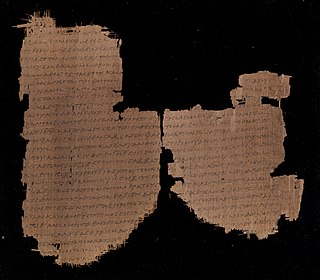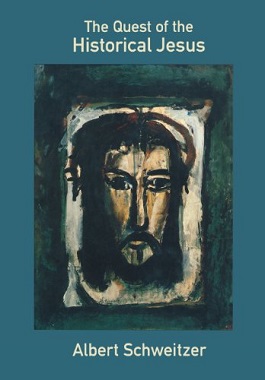Related Research Articles

The Gospel of Luke is the third of the New Testament's four canonical Gospels. It tells of the origins, birth, ministry, death, resurrection, and ascension of Jesus. Together with the Acts of the Apostles, it makes up a two-volume work which scholars call Luke–Acts, accounting for 27.5% of the New Testament. The combined work divides the history of first-century Christianity into three stages, with the gospel making up the first two of these – the life of Jesus the messiah (Christ) from his birth to the beginning of his mission in the meeting with John the Baptist, followed by his ministry with events such as the Sermon on the Plain and its Beatitudes, and his Passion, death, and resurrection.
Gospel originally meant the Christian message, but in the 2nd century it came to be used also for the books in which the message was reported. In this sense a gospel can be defined as a loose-knit, episodic narrative of the words and deeds of Jesus, culminating in his trial and death and concluding with various reports of his post-resurrection appearances.

Bruno Bauer was a German philosopher and theologian. As a student of G. W. F. Hegel, Bauer was a radical Rationalist in philosophy, politics and Biblical criticism. Bauer investigated the sources of the New Testament and, beginning with Hegel's analysis of Christianity's Hellenic as well as Jewish roots, concluded that early Christianity owed more to ancient Greek philosophy (Stoicism) than to Judaism.
The historicity of Jesus is the question of whether Jesus historically existed. The question of historicity was generally settled in scholarship in the early 20th century. Today scholars agree that a Jewish man named Jesus of Nazareth did exist in the Herodian Kingdom of Judea and the subsequent Herodian tetrarchy in the 1st century AD, upon whose life and teachings Christianity was later constructed, but a distinction is made by scholars between 'the Jesus of history' and 'the Christ of faith'.

Modern Biblical criticism is the use of critical analysis to understand and explain the Bible without appealing to the supernatural. During the eighteenth century, when it began as historical-biblical criticism, it was based on two distinguishing characteristics: (1) the scientific concern to avoid dogma and bias by applying a neutral, non-sectarian, reason-based judgment to the study of the Bible, and (2) the belief that the reconstruction of the historical events behind the texts, as well as the history of how the texts themselves developed, would lead to a correct understanding of the Bible. This sets it apart from earlier, pre-critical methods; from the anti-critical methods of those who oppose criticism-based study; from the post-critical orientation of later scholarship; and from the multiple distinct schools of criticism into which it evolved in the late twentieth and early twenty-first centuries.

Rudolf Karl Bultmann was a German Lutheran theologian and professor of the New Testament at the University of Marburg. He was one of the major figures of early 20th-century biblical studies. A prominent critic of liberal theology, Bultmann instead argued for an existentialist interpretation of the New Testament. His hermeneutical approach to the New Testament led him to be a proponent of dialectical theology.

Raymond Edward Brown was an American Sulpician priest and prominent biblical scholar. He was a specialist on the hypothetical Johannine community, which he speculated contributed to the authorship of the Gospel of John, and he also wrote studies on the birth and death of Jesus.
Liberal Christianity, also known as liberal theology and historically as Christian Modernism, is a movement that interprets Christian teaching by prioritizing modern knowledge, science and ethics. It emphasizes the importance of reason and experience over doctrinal authority. Liberal Christians view their theology as an alternative to both atheistic rationalism and theologies based on traditional interpretations of external authority, such as the Bible or sacred tradition.
Postliberal theology is a Christian theological movement that focuses on a narrative presentation of the Christian faith as regulative for the development of a coherent systematic theology. Thus, Christianity is an overarching story, with its own embedded culture, grammar, and practices, which can be understood only with reference to Christianity's own internal logic.
The quest for the historical Jesus consists of academic efforts to determine what words and actions, if any, may be attributed to Jesus, and to use the findings to provide portraits of the historical Jesus. Conventionally, since the 18th century three scholarly quests for the historical Jesus are distinguished, each with distinct characteristics and based on different research criteria, which were often developed during each specific phase. These quests are distinguished from earlier approaches because they rely on the historical method to study biblical narratives. While textual analysis of biblical sources had taken place for centuries, these quests introduced new methods and specific techniques to establish the historical validity of their conclusions.

The Christ myth theory, also known as the Jesus myth theory, Jesus mythicism, or the Jesus ahistoricity theory, is the view that the story of Jesus is a work of mythology with no historical substance. Alternatively, in terms given by Bart Ehrman paraphrasing Earl Doherty, it is the view that "the historical Jesus did not exist. Or if he did, he had virtually nothing to do with the founding of Christianity."
Craig L. Blomberg is an American New Testament scholar. He is currently the Distinguished Professor Emeritus of the New Testament at Denver Seminary in Colorado where he has been since 1986. His area of academic expertise is the New Testament, including subjects relating to parables, miracles, the historical Jesus, Luke-Acts, John, 1 Corinthians, James, the historical trustworthiness of Scripture, financial stewardship, gender roles, the Latter Day Saint movement, hermeneutics, New Testament theology, and exegetical methods. Blomberg has written and edited multiple books.
Criticism of the Bible refers to a variety of criticisms of the Bible, the collection of religious texts held to be sacred by Christianity, Judaism, Samaritanism, and other Abrahamic religions. Criticisms of the Bible often concern the text’s factual accuracy, moral tenability, and supposed inerrancy claimed by biblical literalists. There remain questions of biblical authorship and what material to include in the biblical canon.

Robert McNair Price is an American New Testament scholar who argues in favor of the Christ myth theory – the claim that a historical Jesus did not exist. Price is the author of a number of books on biblical studies and the historicity of Jesus.
Thomas L. Thompson is an American-born Danish biblical scholar and theologian. He was professor of theology at the University of Copenhagen from 1993 to 2009. He currently lives in Denmark.

The Quest of the Historical Jesus is a 1906 work of Biblical historical criticism written by Albert Schweitzer during the previous year, before he began to study for a medical degree.

David Friedrich Strauss was a German liberal Protestant theologian and writer, who influenced Christian Europe with his portrayal of the "historical Jesus", whose divine nature he explored via myth. Strauss conceived of myths as expressions of Truths, as opposed to the modern shorthand of myth for "falsity"- Strauss did not deny Jesus' divine nature. His work was connected to the Tübingen School, which revolutionized study of the New Testament, early Christianity, and ancient religions. Strauss was a pioneer in the historical investigation of Jesus.
Nicholas Perrin is an American religious scholar and the Senior Pastor at Corinth Reformed Church in Hickory, North Carolina. Formerly, he served as an academic administrator who served as the 16th president of Trinity International University, a Christian university located in Deerfield, Illinois.

The Christ Myth, first published in 1909, was a book by Arthur Drews on the Christ myth theory. Drews (1865–1935), along with Bruno Bauer (1809–1882) and Albert Kalthoff (1850–1906), is one of the three German pioneers of the denial of the existence of a historical Jesus.
Paul N. Anderson is an American New Testament scholar conducting research on the historical, cultural, and theological background of the Gospel of John, the historical Jesus, Quakers and Spirituality studies. He is Professor of Biblical and Quaker Studies at George Fox University since 1989 and was a founding member of the John, Jesus, and History Project at the Society of Biblical Literature (2002-2016). He also serves as Extraordinary Professor of Religion at North-West University in Potchefstroom, South Africa and has served as a visiting professor or researcher at Haverford College, Yale Divinity School, Princeton Theological Seminary, the Johannes Gutenberg University of Mainz, the Radboud University of Nijmegen, and Chapman University.
References
- ↑ "THOMAS JAMES THORBURN" (PDF). oldcestrefeldians.org.uk. p. 55.
- ↑ "DG A220: Thomas James Thorburn". Friends of Hastings Cemetery.
- ↑ Anonymous. (1913). Reviewed Work: Jesus the Christ, Historical or Mythical? by T. J. Thorburn. The Biblical World 41 (3): 214-215.
- ↑ Case, Shirley J. (1914). Reviewed Work: Jesus the Christ: Historical or Mythical? A Reply to Professor Drews' "Die Christusmythe" by T. J. Thorburn. Harvard Theological Review 7 (4): 625.
- ↑ Anonymous. (1917). Reviewed Work: The Mythical Interpretation of the Gospels: Critical Studies in the Historical Narratives by T. J. Thorburn. The Biblical World 49 (6): 377.
- ↑ T. W. (1917). Reviewed Work: The Mythical Interpretation of the Gospels by Thomas James Thorburn. The American Journal of Theology 21 (2): 315.
- ↑ Anonymous. (1917). Recent Religious Thought. The Independent 89: 31
- ↑ Anonymous. (October 14, 1915). English Pastor Wins Bross Prize of 6000. Chicago Tribune . p. 16
- ↑ Wilder, Amos N. (2014). Modern Poetry and the Christian Tradition: A Study in the Relation of Christianity to Culture. Wipf and Stock. p. 282. ISBN 978-1-62564-506-7